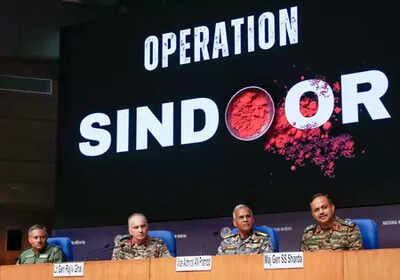India’s Operation Sindoor, launched just past midnight on May 7, marked its most assertive military response yet to cross-border terrorism. Triggered by the Pahalgam massacre – where pilgrims were targeted in a brutal execution-style killing – the Indian military executed coordinated strikes deep inside Pakistan, hitting high-value terrorist infrastructure.The response was swift, multi-domain, and precise. India used stand-off weapons, including air-launched cruise missiles, loitering munitions, and long-range drones, to hit nine locations across Pakistan – including Muridke and Bahawalpur, the symbolic and operational hubs of Lashkar-e-Taiba and Jaish-e-Mohammed.Why it mattersUnlike earlier military responses such as the 2016 Uri surgical strikes or the 2019 Balakot airstrike, Operation Sindoor wasn’t about symbolism or deterrent threats. It was about imposing direct, material costs – degrading terrorist capabilities and forcing Pakistan’s military-terrorist nexus to rethink its operational latitude.India didn’t just retaliate – it escalated and won the round convincingly.

What they’re saying
- “There is no such place in Pakistan where terrorists can sit and breathe in peace. We will enter their homes and kill them,” Prime Minister Narendra Modi declared on May 13 at an Indian Air Force base.
- “India’s response will be even stronger,” Modi told US Vice President JD Vance when informed of Pakistan’s intent to retaliate.
The big picture
- Choice of targets: India went after the heart of Pakistan’s terror ecosystem. Muridke and Bahawalpur are not just military targets – they are ideological nerve centers. India also struck facilities in Pakistan-Occupied Kashmir and at least one known operational base of Hizbul Mujahideen.
- Tactical surprise: Despite being anticipated, India pulled off the strikes with precision. Insiders told TOI the government achieved a “bol ke mara, jo kaha so kiya” moment – a promise delivered, in full view.
- Jointness in action: The operation involved the Indian Army, Navy, and Air Force working in coordination – a level of interoperability India has long aspired to.
Modi govt’s doctrine: The cost of violenceIndia’s strategic thinking has moved from restraint (2001–2016) to risk-taking (Balakot), and now to routine, calibrated retaliation. PM Modi framed it bluntly: Pakistan’s nuclear deterrence no longer ties India’s hands. His May 12 speech called Sindoor a “new benchmark” and declared a “new normal” – one where India will default to military responses against terrorism.“We will not be deterred by nuclear threats… we consider terrorists and their military backers one and the same,” Modi said.This was more than political rhetoric. As insiders from India’s defense establishment told The Times of India, “The consultations were not about if we should strike. They were about where and when.”In an article in War on the Rocks, analyst Arzan Tarapore writes: “New Delhi appears to have now concluded that the best approach for such an adversary is attrition. The adversary’s intent cannot be changed, but the regular imposition of meaningful material costs could at least degrade its capacity to act.”Zoom in:Operation Sindoor didn’t just demolish infrastructure – it pierced the sense of impunity long enjoyed by Pakistan-based terror groups. By launching precise, visible strikes on their most symbolic sanctuaries, India has forced Lashkar-e-Taiba, Jaish-e-Mohammed, and others into a psychological recalibration. The message was clear: no place is beyond India’s reach. As War on the Rocks notes, these groups will now have to constantly watch their backs, draining energy, focus, and resources that were once singularly aimed at India.Terrorist leaders now operate under constant fear of targeted Indian strikes, forcing them to adopt a survival-first mindset that undermines their ability to plan large-scale attacks.Groups like Lashkar-e-Taiba and Jaish-e-Mohammed will have to divert manpower and funding to rebuild destroyed facilities, which limits their offensive posture and compels them to adopt more clandestine modes of operation.The traditional safe havens – once untouchable hubs in places like Muridke and Bahawalpur – are now exposed, making even routine activities like training, recruiting, and logistics a potential liability.
Operation Sindoor has now kicked off a cat and mouse game where the terrorists, previously enjoying safe haven in Pakistan, will take greater measures to hide in peacetime and go to ground in crisis
Arzan Tarapore’s article on Operation Sindoor in War On The Rocks
Leadership decapitation, such as the near-miss on Masood Azhar and the death of multiple family members, introduces fear and mistrust within command structures, especially around the reliability of their Pakistani military protectors.Like Israel’s enemies after repeated strikes, Pakistan-backed terrorists will increasingly spend operational cycles on evasion and concealment – not aggression – potentially reducing the frequency and scale of attacks on Indian soil.
Henceforth vulnerable to direct military action, Pakistan-based terrorists will have to devote a share of their work to defensive preparations, possibly taking resources away from planning operations in India.
Arzan Tarapore’s article on Operation Sindoor in War On The Rocks
The Israel parallelIn its logic, India’s new strategy closely mirrors Israel’s “mowing the grass” doctrine – periodic military actions meant not to eliminate enemies or end conflict, but to degrade capacity and buy stretches of relative quiet. Israel long ago accepted that peace with groups like Hezbollah or Hamas was unlikely. Instead, its strategy has focused on trimming their power at regular intervals.India, similarly, appears to have accepted that terrorism from Pakistan is not a policy aberration, but an enduring feature. The goal now is management, not resolution.Tarapore puts it plainly: “If India can effectively degrade the enemy — meaning both the terrorist networks and their army backers — then future attacks may at least be less destructive and less frequent. This strategic concept depends on India retaliating swiftly and heavily to every attack.”What’s next
- Operation Sindoor was effective -but future rounds may get tougher.
- Terrorists now know they’re vulnerable. They will adapt, hide, and reconstitute. India’s intelligence and strike capabilities must evolve further.
- Public expectations: Modi’s muscular approach has raised nationalist fervor. Managing domestic expectations in future crises will be as critical as managing escalation.
- Policy tradeoffs: Military force alone isn’t enough. India will also need to leverage diplomacy, economic tools (like the Indus Waters Treaty), and global coordination against terror financing. Otherwise, the military strategy risks becoming an end in itself – not a step toward resolution.
(With inputs from agencies)







